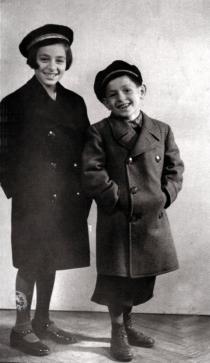Emanuel Gruber's family
This is my family. From right to left are my sister Judit Grunberger (nee Gruber), my father Emanuel Gruber, my mother Erzsebet Gruber (nee Sporn) and I as a handsome young boy. The photo was taken around 1940 in the Julietta Salon, the favorite photo salon of the family. Judging from the way we are dressed here, the photo must have been taken in fall.
At the beginning, in the 1930s, we rented an apartment near the railway station. From there we moved to Hosszu Street, into a quite big single-story house, where we had three rooms, I think. The house also had a garden. Then we moved into the center of town, to one of the main streets of Brasso. It was an old house, built in typical Saxon style - it was a long house, which extended far back from the street and its entrance opened onto the street. A law was passed in the 1930s and my father's business wasn't going that well after that. So my mother opened a corset salon on the ground floor because my father's salary was no longer enough to ensure a comfortable life. We always lived on a middle-class level. They didn't pursue this corset making because they liked it or because they were so eager to work, but because it was necessary to support the family.
After 1940, when the legionaries came into power in Romania, a legionary woman came into my mother's workshop one day and behaved as if she was the owner. She expropriated my mother's workshop and wanted to have everything. She took hold of the two Singer sewing machines in the workshop, the materials that were there - linen and rubber for the corsets - and simply occupied the shop. After the clash between Antonescu and the legionaries, in which Antonescu suppressed the legionaries' coup, the woman walked out of the shop. But it would have been useless to open the shop, because she took the sewing machines, the materials, the counter, she took everything and left the shop completely empty.
In 1943 a sign printed on yellow paper appeared in Saxon bars, restaurants and pastry shops, which said 'Eintritt fuer Juden ist unerwuenscht', which means that the entry of Jews was undesirable. These posters were still up in these places even in 1944. People didn't dare to take them off; the pressure on them was too big. My father was sorely tried by this mentally because he was a very conscientious person and always stressed that Jews as a people weren't inferior in any respect to any other people. But he could more or less ensure a financial stability for the family. He worked as a broker at the stock exchange at that time and he also ran a lottery business. In the 1940s, Jews usually had strohmans - which literally means straw man - to work with. Strohmans were [non-Jews], and the business was under their name but in reality it still remained one's [the Jew's] own business. He lent his name to the business and one had to pay him a certain amount of money for it. That's how my family could ensure a living at that time.
During the war my father was drafted into forced labor and he worked for the railways, sometimes in Brasso and sometimes in Predeal. There was external forced labor outside the town of Iasi, Bessarabia, and there was internal forced labor [in the town or in its vicinity]. The authorities didn't profit much from Jewish labor because the Jews, especially those who were in internal and not external forced labor, didn't kill themselves over work. I also worked, for example, at the end of 1943 and in 1944. We stayed in town, we slept at home but we didn't get any food, money, clothes, boots or anything, and were forced to carry out whatever tasks we were given from six in the morning until six in the evening. There was a time when one could buy his way out of forced labor. My father managed to do this and he didn't work in forced labor for long. After 1944, he kept on working in the lottery office but later lottery was banned and he became a petty clerk at the municipal people's council.
























